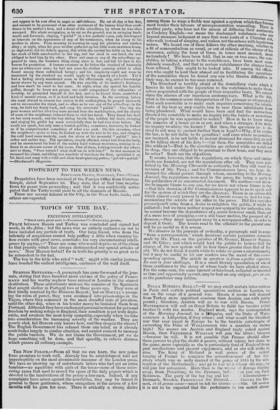THE NEW PomcE.—From all that we can learn, the new
police force promises to work welL Already has its establishment told not imperceptibly on the most abominable nuisance of the London press. We have no showing up of unfortunate tailors who had got an extra tumbler—no squabbles with girls of the town—none of those inter- esting cases that used to crowd the space of the daily papers which is devoted to the lucubrations of the penny-a-line-men. Indeed, if any complaints have arisen against the constables, they may be traced in general to these gentlemen, whose occupation in the course of a few months will be gone for ever. There is evidently a strong desire among them to wage a feeble war against a system which they foresee must render their labours of misrepresentation unavailing. There is another party, who have not the means of diffusing their sentiments in Cockney English—we mean the discharged watchmen—who are beyond measure indignant at men that wear coats of a Christian cut, who walk instead of sleeping, and waken not the echoes with lugubrious' noises. We heard one of these fellows the other morning, whether in a fit of somnambulism as usual, or out of ridicule of the silence of his successor, calling the hour of three, in tones most musical, most melancholy ! We have been told, that in one or two cases, the con- stables, in taking a charge to the watchhouse, have been most scan- dalously assaulted, and that in certain watehhouses the charges have been refused. This ought to be looked into. Ifamong the officio.. ries who ought to lend their utmost aid in facilitating the operations of the constables there be found any one who throws difficulties in their way, he cannot be too soon removed. The Standard is terribly afraid of the domiciliary visits which it fancies lie hid under the injunction to the watchmen to make them- selves acquainted with the people of their respective beats. We cannot share the alarms of our ingenious contemporary. What is the fair, what is the common sense interpretation of the passage so vituperated? That each constable is to make such inquiries concerning the tants of his beat as may enable him to save those inhabitants from being plundered. What would have; been said had the instructions directed the constable to make no inquiry into the habits or avocations i of the people he was appointed to watch ? How is lie to know when the inmates of a house go in or out, and when a stranger, if he make no inquiry touching the former? But then, the questions he is de- sired to ask may be pushed further than is legal!—Why, if he violate the law, is he not liable to its penalties? and even where no penalties are incurred, is he not liable to instant dismissal for exceeding as well as for falling short of his duty?—Lot then, the constables are drilled like soldiers !—That is, the constables are ordered while on watch not to sleep, they are obliged to be punctual to their hour, amt they must be sober! Such are the objections. It seems, however, that the regulations, on which these and similar cavils are founded, are not the regulations after all. They were pub- lished by the Morning Chronicle as authentic, but they still want the revision of Mr. PEEL ; and the Commissioners have, we hear, dis- charged the official person through whom, according- to the Mornii,2,- Journal, the regulations were sent to the press, for being a party to the publication of an uncorrected document. We confess—not mean- ing to impute blame to any one, for we know not where blame is due —that this decision of the Commissioners appears to us to speak well for the system of which they are the directors. There is an odious itch which almost every person in office in London seeusa to feel for com- municating the secrets of his office to the press. Did this cacoi;thes promulgandi arise from a desire to enlighten the public, it might be palliated ; but we have neither respect nor sympathy for imbeciles, who no sooner become the depositories of a secret however small, than, out of a mere love of gossiping,—or a still baser motive, the prospect of a douceur,—they must scamper away to a newspaper-office, in order to deposit it there: The lesson read to the offender in the present case will be as useful as it is severe.
We observe in the journals of yesterday, a paragraph said to come " from a correspondent," which mentions certain pecuniary demands made by Mr. PEEL on the parishes of St. George, Hanover Square, and St. Giles ; and which would lead the public to believe that the charge of the new system will be four times greater than that of the old. We do not think it worth while to refute so gross a misstatement; but it may be useful to let our readers into the secret of this corre- sponding system. The article in question is from apolice reporter. Its cost is four shillings. It is a small literary speculation of one of those gentlemen to the decay of whose trade we have alluded above. For the same sum, the same amount of falsehood, collected or invented as time and opportunity permit, may be had on any subject, pro or con as the purchaser may incline. z.


















 Previous page
Previous page